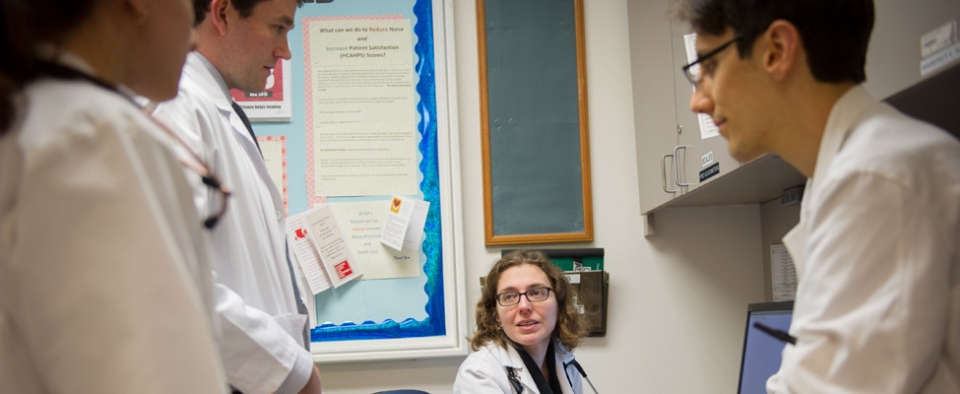Pulmonary Hypertension
The Pulmonary Center at the Weill Cornell Perkins Center for Heart Failure and Pulmonary Vascular Disease is a Tier 1 Pulmonary Hypertension Comprehensive Care Centers accredited by the Pulmonary Hypertension Association. Our center is one of the only centers in New York to receive this accreditation and was amongst the first pulmonary hypertension programs in the nation to become accredited, contributing data and research to the PHAR (PHA Registry).
Under the leadership of Dr. Evelyn Horn, a well-known leader in pulmonary hypertension (PH), our center is at the forefront of patient care, PH research and education, and mentoring of the next generation of providers and investigators. Our center provides expertise in the management of patients in Groups 1-5 PH, “mixed groups”, and provides super subspecialized care for the difficult to diagnose PH patients as well as a referral center for NYPH Methodist PHA Regional Care Center and others.
What is Pulmonary Hypertension?
Pulmonary hypertension (often referred to as “PH”) is a vascular disease of the lung vessels associated with elevated blood pressure in the lungs. Pulmonary hypertension affects the arteries, and sometimes the veins and capillaries, making it harder for your heart to pump oxygen-rich blood, which may ultimately lead to right heart dysfunction and failure.
The most common symptoms of pulmonary hypertension include:
- Shortness of breath
- Difficulty exercising
- Chest pain
- Chest pounding
- Near or complete fainting
- Right-sided heart failure symptoms, including swelling in ankles and legs (edema) and fluid in the abdomen (ascites)
Expert Diagnosis
Patients are often referred with suspected pulmonary hypertension based on either a routine echo or possible evidence of pulmonary artery enlargement on chest imaging, underlying rheumatological disease (scleroderma, lupus), adult congenital heart disease, acquired valvular diseases, HFrEF, HFpEF, interstitial lung disease, hematological diseases (hemoglobinopathies, myeloproliferative disease), portal hypertension, HIV, thromboembolic disease all diseases which carry heightened risks for PH.
Patients will receive a variety of tests to correctly diagnose the condition inclusive of advanced cardiac and pulmonary imaging, cardiopulmonary physiological assessment with noninvasive and sometimes invasive exercise testing, appropriate assessment for associated rheumatological, hematological, systemic conditions and frequently genetic testing. Ultimately, it is the right heart catheterization that is the gold standard to diagnose this complex disease inclusive of subtleties, which is usually done with acute vasodilator or provocative exercise testing, shunt runs, sometimes in combination with left heart catheterization or pulmonary angiography.
Treatment Options
Our program provides a multidisciplinary approach to treatment inclusive of our colleagues in interventional cardiology, cardiac imaging, pulmonary, rheumatology, hematology, cardiothoracic surgery, interventional radiology, palliative care, lung transplantation and physical therapy. The individualized care approach is provided via a team of physicians, nurse practitioners, nurses, administrative support to navigate specialty pharmacy and related medication issues, psychosocial support and cardiopulmonary rehab therapy.
Patients diagnosed with CTEPH are evaluated for pulmonary thromboendartectomy (PTE), balloon pulmonary angioplasty (BPA) and hybrid procedures.
Where appropriate, a select few patients are considered for atrial septostomy procedures to decompress the RV/RA, rarely a Potts shunt (pulmonary artery to descending aorta). Newer investigational pulmonary artery denervation techniques are part of the research studies.
Patients are referred for transplant evaluation at the appropriate time and ideally prior to decompensation when they may be deemed “too well for transplant” but without contraindications, with active listing deferred but all testing completed and ongoing participation in educational support groups.
Medications include diuretics, pulmonary vasodilators inclusive of endothelin receptor antagonists, phosphodiesterase inhibitors or guanylate cyclase stimulators, prostanoids (oral, inhaled, subcutaneous, intravenous). The newest addition is sotatercept (winrevair), which is given subcutaneously, and represents the successful bench to bedside development of an activin inhibitor “fusion protein” that beneficially rebalances the stimulation effects of growth factors. For some, anticoagulation is indicated. For a few patients, calcium antagonists may be used if “acute responder”. Iron supplementation if iron deficient. Often there may be access to ongoing newest investigational protocols.
Our program also provides exercise recommendations and referral to pulmonary rehabilitation, oxygen (exercise or nocturnal) and CPAP when indicated, nutrition support, psychological support, referral to our subspecialists as indicated, research study opportunities (participation in multicenter clinical trials as well as original research), and end-of-life management and palliative care for patients with unresponsive symptoms and limited life expectancy.
Schedule an Appointment
To schedule an appointment to see one of our physicians with expertise in pulmonary hypertension, you may call our physician offices directly at (646) 962-5555 or email hfadmin@nyp.org.
If you are already an established patient, you may also request an appointment online using Weill Cornell CONNECT. We will make every effort to contact you within 24 hours.
Our staff is here to help coordinate your care. They will provide you with information on our physicians, their areas of expertise and help arrange for your visit and other testing when appropriate.
Visitor Information
Learn more about how to prepare for your appointment, what to expect, and getting to your appointment.
PHA Understanding Pulmonary Hypertension
The PHA guide to Understanding Pulmonary Hypertension.
Our Physicians
| Faculty | Title | Phone | ||
|---|---|---|---|---|
 |
Evelyn M. Horn, M.D. |
Professor of Clinical Medicine, Director, Perkin Heart Failure Center | 646-962-5555 | Full Profile |
 |
Maria Karas, M.D. |
Associate Professor of Clinical Medicine, Director Cardiac Care Unit, Director Clinical Affairs | 646-962-5555 | Full Profile |
 |
Udhay Krishnan, M.D. |
Assistant Professor of Medicine | 646-962-5555 | Full Profile |
 |
Irina Sobol, M.D. |
Assistant Professor of Medicine, Director Advanced Heart Failure Fellowship Program | 646-962-5555 | Full Profile |


